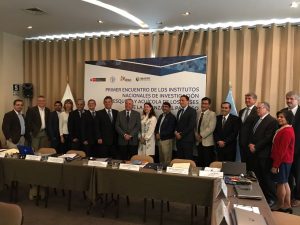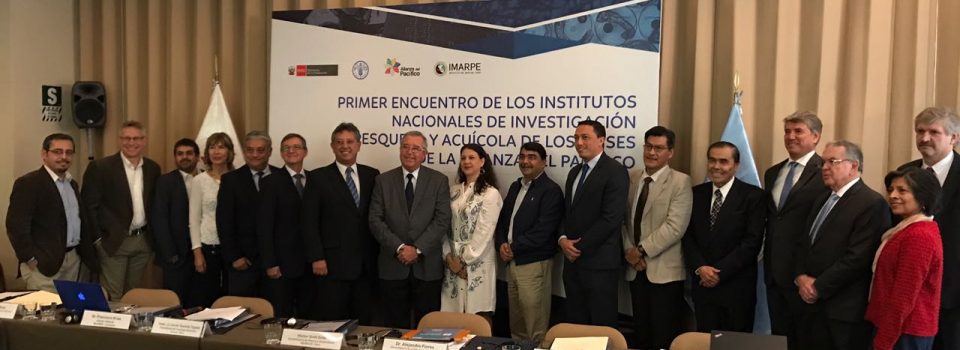First Alianza Pacífico meeting of national fisheries and aquaculture research institutes
July 18th, 2017
Participants included Chile, Peru, Colombia, Mexico, Argentina, Australia and FAO Regional Office for Latin America and the Caribbean
Between July 5 and 7 in Lima, Peru, the first Alianza Pacífico meeting of national fisheries and aquaculture research institutes was convened by Héctor Soldi Soldi, Peru’s Vice Minister of Fisheries and Aquaculture. Instituto de Fomento Pesquero (IFOP) Chile(Chilean Institute for Fishing Promotion); Francisco Arias Institute of Marine and Coastal Research General Director, (INVEMAR) Colombia; Pedro Antonio Ulloa, Regional Fishery Research Center Bahía De Banderas, Nayarit, National Institute of Fisheries and Aquaculture, (INAPESCA) Mexico; Otto Wohler Director, National Institute of Fisheries Research and Development, (INIDEP), Argentina; Richard Little Research Group on Oceans and Atmosphere Commonwealth Scientific and Industrial Research Organization Director , (CSIRO); Australia, Alejandro Flores Official FAO Regional Officer for Latin America and the Caribbean.
The meeting objectives were: To create a space for technical dialogue in the field of fisheries and aquaculture. Exchange information on research work. Identify project opportunities. Establish an information network between researchers and fisheries and aquaculture research institutions.
Leonardo Nunez from IFOP explained “national fisheries status, IFOP, is a privately owned corporation, but with state funding, and with a public role in scientific advice for decision making.
Chile rests much of its growth on a natural resource basis, demand for animal protein will increase, and we want to have our fisheries recovered. It requires changing the vision of how to do things and move definitively to an ecosystemic approach. It is interesting to bear this in mind in our discussion the UN Sustainable Development Goal 14. So far a vision for some kind of “Backdrop”.
IFOP has set three specific work lines for the immediate future: fisheries reconstruction through management strategies assessment, fisheries management ecosystemic approach, climate change and biophysical modeling. In relation to aquaculture IFOP has developed 3 research lines, focusing mainly on diseases and responsible use of veterinary drugs, and to a lesser extent modeling for the determination of load capacities; A third issue is the bioeconomics or economics of aquaculture. ”
Alejandro Flores from FAO, said “since 2012, FAO has maintained a new strategic framework with five lines of action: eliminating hunger and food insecurity and malnutrition; Reduce rural poverty; Increase food production sustainably; Promoting inclusive and efficient agro-food systems; And increase the resilience of livelihoods in the face of catastrophes. FAO recognizes inter-agency joint work and that “strategic alliances with the Academy have a strategic potential in the fight against hunger …”.
